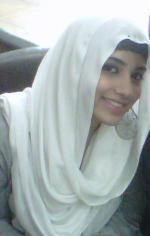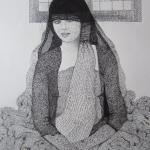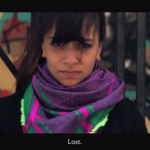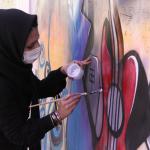A young girl reflects on her experience--and ultimately, loss of innocence--growing up as a Muslim in a Muslim-majority country with its own prejudices.
I could hear the rush of the wind, fast and almost painful, whipping around me in every direction and howling in my ears with the open expanse of the desert providing no break from it or a moment of quiet. I tightened my grip, only finding more strength in myself, determined to ignore the windy chaos. I ignored the yells of caution given by the on looking adults, too far in my own head and too lost in the rush of adrenaline that pumped through my veins. Fires burned on either side of the road, marking my goal. The long stretch of road went on and on, into the horizon that I couldn’t see. But that was not my concern. My concern was beneath me, the terrifying height and slope that lay before my eyes. On this enormous mountain, the road seemed even more daunting, my bike feeling small and fragile in the face of its enormity. But no matter, I had already accepted the challenge and that meant only one thing. Barely audible, I heard the yell of one of my friends. “One, two, three, GO!!!!” My legs began pedaling before I had time to process anything, hardly daring to check how far behind my competitors were. Then came the best part: the slope, a dangerously narrow incline, on the highest mountain in the area, and I knew how to beat everyone. I did not pedal faster. I simply let go. Pulling my legs up higher so as to not touch the pedals, I felt the exhilarating swoops in my stomach, increasing in number as the speed increased beyond my control. I was flying down the mountain, holding on for dear life, with mad laughter in my head. It was not really about who would win anymore, but about the rush, the effort to climb the mountain and making it. As we finally passed through the end line, bordered with fire on two sides, I laughed out loud now, letting my laughter get lost in the sounds of the desert, feeling my high wear off. I looked around, savoring my surroundings, loving everything I saw, despite the fact that there was nothing around me of much, if any, consequence.

I saw endless horizons of sand, rocks and roads. Everything was a shade of whitish brown, getting darker as the sun set. There were a handful of our cars, scattered children and adults, and abandoned tyres littering the sand. This was our spot. On lazy Fridays when there was nothing to occupy ourselves with, a group of us would set out for the desert, going far in to it, looking for our identifier: an old, two-seat sofa, ripped and partly burnt, abandoned in the middle of nowhere. We would settle down there for the day, finding joy in riding our bicycles on seemingly endless roads, and only once down the mountain, the climb being too difficult with the weight of our bikes. We filled the desert with our laughter, the sounds of children playing and adults talking. We found amusement in burning the huge tyres scattered around us. As we lay down to watch the black smoke clouds, thicker than we remembered from the last time, leaving a trail up to the infinite sky for us, we never once stopped to consider the frivolity of our fun. To us, it was the time of our lives. To me, I felt infinite, on top of the world—my small, extremely small world.
My world was the city of Riyadh, amongst dunes of sand and sweltering heat, it flourished, bright and full of possibilities, where I was raised from when I was merely 24 days old until the time I was a teenager. My life began and seemingly would end within this city’s borders, leaving me perfectly content somewhere in the middle. My family and I were the outsiders that had become insiders, simply because of the time and love we had given to this city. The luxuries this country provided were impressive, as my father worked in a multinational corporation as the IT manager and yet we lived as though he may as well have been one of the top ranking officials in the company. We went from tiny, box-sized apartments, to moderate-sized duplexes, to a two-floored villa, and, finally, to a huge four-story house, with vast rooms and marble floors, in a compound of seven such houses. Starting from almost nothing and building our way to the top, we had earned every luxury we attained, and yet at every stage we felt like we were living the dream. Our houses felt like castles, our cars seemed the best of the best, and our adventures in an adventure-less city made us everything we were. We lived like kings and queens in the most unlikely of places.
Our time was spent frivolously in between home, school, malls, and the desert. Almost every single moment was spent with loved ones, be it our aunts, uncles, cousins or our family friends or the many friends we had at school. Every occasion, regardless of how simple, was accentuated by the presence of those that we loved and knew entirely. As children, we lived in the safe and comfortable bubble of life that was given to us by our parents, our idea of fun always being in line with their ideas. As we grew older, our city did not fail to accommodate our new ideas of fun, and we spent time with all kinds of friends in the popular places to hang out: malls or compounds of villas and apartments. We would spend all our days there, with residential areas being the only place you could loiter and talk to girls and boys your own age without being told off by the conduct police, called the muttawa’s, or worse, but that we never experienced, being protected by the fact that we were girls, since the rules were incredibly harsh on men and boys, but not directly harsh to women and girls.

As we grew older, and our connection with the outside world grew, we became increasingly aware of the things we were missing out on. The cinemas, the option of not having to wear an abaya, a black cloak-like religious dress for women that was compulsory on you from the age of whenever you began looking like a girl, the universities that girls were allowed to go to, the freedom to buy houses even if you were not a local – all of our houses were rented, the sale of a house to a non-Saudi was prohibited - the freedom to go around telling people you were from a different part of the world without being looked upon with contempt, sometimes even hatred and disgust, and most astonishing and laughable of all, the freedom for women to drive. Regardless, we persisted with our love for this city, and the country of Saudi Arabia, believing ourselves to be content with the wonderful life we had, continuously ignoring the less pleasant sides of that life. Our schools, beginning from primary school, were divided along gender lines. The separation was not only between girls and boys, but also between Saudis and everyone else. They had always had noticeably better campuses, better facilities, better rights, and though at times this seemed unfair, we persisted on with our belief in our wonderful life and found our reasoning validated in the Saudis that we personally knew that were genuinely good people.
At the age of twelve, we had reached the stage of our life when we lived in our biggest house yet, a four-storey villa, in a compound with six other such houses. Out of these other houses, four were occupied by Saudis, and the other two by Lebanese and Iraqi families. We were all too aware of the hatred that two of those four Saudi families felt for us, more so from their children, who were around the same age as me and my sister. Our parents continued to shield us from it though, and the minor troubles they had given us, such as verbal abuse and vandalism of some of our possessions, had gone ignored by us thus far. One day, upon our return home from a long and tiring day out with our friends and family, being blissfully happy and tired, we began to make for the stairs to reach our tempting beds when I heard my mother let out a gasp. We turned to look, and there lay our wall-sized window that looked out into the garden, in pieces all over the floor, with rocks amidst the mess. Outside, there was a plastic bag that had burst all over our garden of what appeared to be mud, but on further inspection turned out to be dog feces. On this bag, there were racial slurs directed at us. We felt infuriated, hurt and betrayed, and my parents for once, instead of shielding us from it once more, resolved to call the police. When this measure had been taken, we received stiff and formal apologies from the families, and that put the issue to rest in their view. In my view though, it would never be put to rest, as this incident had finally made me admit to my twelve-year old self that we were not living the wonderful life we had convinced ourselves of.
As I grew older, the veil of childhood innocence was lifted off of my eyes further, making me intermittently aware of the bad sides to our life. Children at school that were locals had become accustomed to threatening outsiders with deportation in the smallest of verbal arguments and, needless to say, especially in the more serious ones. This thought of having power over someone else’s deportation from their country was common at that time. Things became worse when I overheard my mother telling her friend a story that I had experienced but had been too young to understand at the time, that of her father passing away in Pakistan, while we lived in Saudi Arabia. At the time, upon learning the news of the death of her father, she had broken down completely, losing herself in her grief, and was desperate to go to Pakistan to see her father before his burial one last time. My father, understanding the depth of her pain that we as children could not comprehend, began trying everything that he could to send her to see him. Yet over and over again, he was denied permission to get the exit fast enough to let her go back to her own country. In the end, they managed to grant the exit, but not until three days had passed, by which point she had undergone severe anxiety and sorrow and much to everyone’s anguish, had not been able to see her father before he was buried deep down in the earth, a most favored daughter never having had the chance to hold her father’s hand and touch his face, one last time.
The cruel and unnecessary nature of this event being recounted in front of my now much-older self was not lost on me. Slowly, I found myself noticing the cracks that had begun to appear in the perfect image that I nurtured of my home, the city I grew up in. People that were close to my heart, such as my paternal grandparents who lived in Jeddah, had begun to leave Saudi Arabia, and as people invariably shape the opinions we have of the places we love, this was a huge disappointment to experience. It seemed that no matter where one lived in this country, as an outsider, disappointment, racism and discrimination were sure to follow at some point or the other. Until the age of thirteen, I had never once allowed myself to consider the possibility of leaving Riyadh, as I believed that it was my sense of partial denial that was keeping me safe from aching to leave to a better city, an ache I knew I would not be able to shake off once it had been acknowledged. Then, on a night in the summer of 2005, our parents left me, my sister and our brother at a friend’s house and left for a few hours. We were blissfully unaware of the reason and more than happy to be at our friend’s house on a weekday. We made the most of our limited time, playing games and catching up on the weekly school gossip. When our parents returned, we were made to leave straightaway, and though I ignored it at the time, a creeping feeling had come into the pit of my stomach judging by the quiet stiffness between my parents that something had gone terribly wrong. We did not have to wait long to find out what it was. Our parents had gone to the hospital and found out that my mother was expecting twins. Needless to say, the feeling in the pit of my stomach turned to instantaneous joy, all of us extremely excited until we realized our parents were not celebrating with us, and my mother had a look of uneasiness on her face. They did not know if they could raise more children at their age, let alone twins, and their emotional strain was paramount. A few months later, as my mother was making to stand up from her prayer mat, she lost her footing and fell, with her stomach taking the blow. After suffering what seemed like a minor fall at the time, my mother was told by the doctor that one of the twins had passed away at his or her seventh-month stage. Devastation does not begin to cover the way we felt, my parents included, and it was accepted as a punishment or a lesson from God. The loss of this tiny, beautiful human life that was not properly celebrated at first caused an unstoppable wave of grief to come over them, and when the remaining twin was born, he was cherished more than any of us could have anticipated, with the lesson of loss fresh in our hearts.
The blow of this new wave of grief upon our family, and especially my parents, only added to the suppressed feeling of impatience and anxiety that we had all begun to feel from our lives in Riyadh, as it is only human nature to run as fast away as we can from the places where our personal tragedies have occurred. Our chance came soon, with my father being offered a job in Malaysia, and it was only then that we dared to let ourselves think of the possibilities a new city could offer us in the journey of our lives that Saudi Arabia had not been able to. On the day that we left Riyadh, our house, and seemingly my entire childhood and been packed away into boxes, and almost everyone we knew had come to see us off. Amidst the chaos of what felt like thousands of people, and the sadness I was feeling, I was never able to say a proper goodbye to my house, my castle, my safe haven. As I sat in the plane on the eight-hour flight away from my heart’s city, I began crying. And soon, I realized I was not crying for the city I had left behind. For that city was merely the frame around the picture, albeit a most valued frame. The picture was my childhood, and every single memory I had of my life thus far. It turned out that my love for Riyadh had an expiration date that came with age and that was inevitable. We had left our lives of royalty, which we lived as kings and queens, only to realize that lives can be made wonderful anywhere in the world, and different places and its people will almost always disappoint us in one way or another. It was only about finding the things that mattered and holding on to them. It was about the picture and not the frame.
- Log in to post comments




